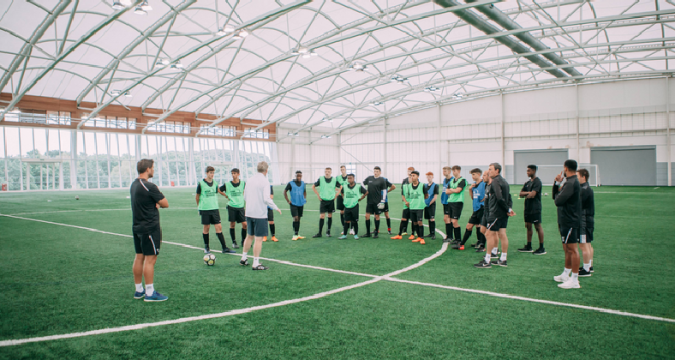
A football team’s success in the high-stakes sport depends on more than just the eleven players that play on the field. A football team’s triumph hinges on a meticulously assembled support staff, working behind the scenes to ensure everything runs smoothly. From coaches to medical experts, each member of the staff plays a critical role in the team’s performance. Here’s an in-depth look at the key personnel needed to build a successful football team.
1. Head Coach
The head coach is the cornerstone of any football team. Responsible for devising tactics, training schedules, and team selection, the head coach shapes the overall strategy and style of play. Their leadership and vision are pivotal, guiding the team through victories and losses alike. The head coach also serves as a mentor to the players, helping them develop their skills and maintain peak physical and mental condition.
2. Assistant Coaches
Assisting the head coach is a cadre of specialized coaches, each focusing on specific aspects of the game. These include:
- Offensive Coach: Focuses on the attacking strategies, helping forwards and midfielders enhance their scoring abilities.
- Defensive Coach: Concentrates on building a solid defense, organizing the backline and teaching defensive tactics.
- Goalkeeping Coach: Works exclusively with goalkeepers, honing their reflexes, positioning, and shot-stopping techniques.
- Fitness Coach: Ensures players maintain optimal physical fitness through tailored training regimens and recovery programs.
3. Medical Staff
A football team’s medical staff is crucial for player health and longevity. This team typically includes:
- Team Doctor: Provides medical care, oversees treatment for injuries, and conducts regular health assessments.
- Physiotherapists: Specialize in injury prevention and rehabilitation, helping players recover from injuries and maintain physical fitness.
- Sports Scientists: Utilize data analysis to monitor player performance, fatigue levels, and overall physical condition, making recommendations for training adjustments and recovery.
4. Nutritionists
Nutrition plays a vital role in a footballer’s performance. Nutritionists design personalized meal plans to ensure players get the right balance of carbohydrates, proteins, fats, vitamins, and minerals. Proper nutrition helps players maintain energy levels, recover faster, and reduce the risk of injuries.
5. Psychologists
Mental resilience is as important as physical strength in football. Sports psychologists work with players to enhance their mental toughness, focus, and stress management skills. They help players cope with the pressures of competition, improve concentration, and maintain a positive mindset.
6. Scouting and Recruitment Team
A successful football team continuously looks to strengthen its squad. Scouts and recruiters travel far and wide to identify and evaluate potential talent. They analyze players’ performances, both in matches and training, to recommend new signings that can add value to the team.
7. Analysts
Modern football heavily relies on data analysis. Analysts study match footage, collect performance metrics, and provide insights that help the coaching staff make informed decisions. They break down opponents’ strategies and pinpoint areas for improvement in their own team’s play.
8. Kit Managers
While it may seem minor, the role of the kit manager is essential. They ensure players have the correct equipment and attire for training and matches. A kit manager handles the logistics of transporting and maintaining team gear, ensuring everything is in perfect condition.
9. Administrative Staff
Behind the scenes, a team of administrative personnel handles the day-to-day operations. This includes scheduling matches, arranging travel, managing finances, and overseeing communications. Their efforts ensure that the football team functions smoothly off the pitch.
10. Public Relations and Media Team
Engaging with fans and managing a team’s public image is crucial in modern football. They ensure positive media coverage and foster a strong connection between the team and its supporters.
11. Support Staff
Lastly, numerous support roles contribute to the team’s success. This includes roles such as groundskeepers who maintain the pitch, ensuring it is in optimal condition for training and matches, and equipment managers who handle logistics beyond just kit management.
A football team’s success is a collective effort, requiring a dedicated and diverse staff working tirelessly behind the scenes. Each member, from the head coach to the support staff, plays a pivotal role in building a well-rounded, high-performing team. The next time you see your favorite team in action, remember the extensive support network that contributes to every pass, goal, and victory.